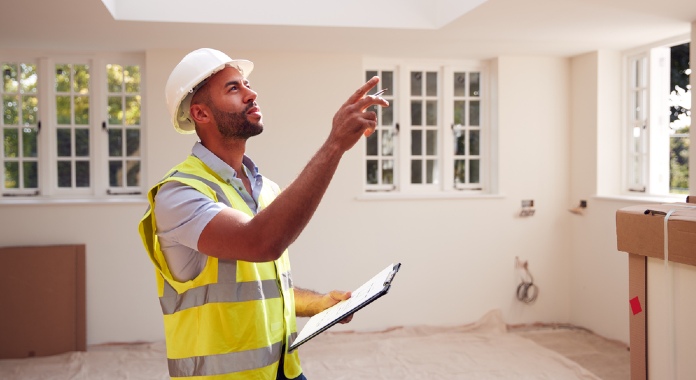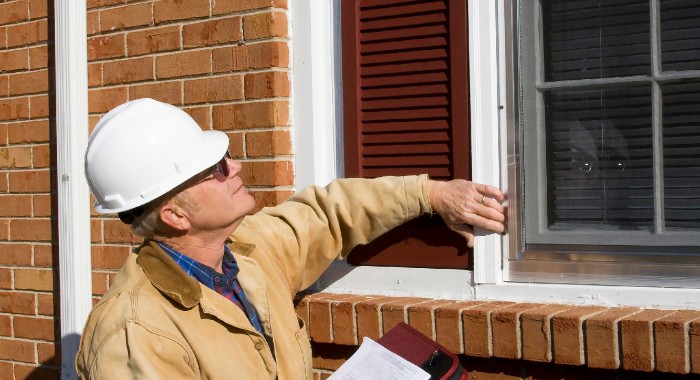Knowing how to choose a chartered surveyor is important once you reach the stage where you need a survey carrying out on a property.
That’s because the survey is one of the most important steps in buying a house. It will identify any issues with the property and provide advice on what needs to be repaired or maintained.
A chartered survey is a highly qualified job. You only become a chartered surveyor once you have passed all the training requirements and achieved an official qualification from the Royal Institution of Chartered Surveyors (RICS).
Chartered surveyors are trained to look out for possible defects and potential problems with a property that the untrained eye may not spot, such as subsidence, damp, and structural defects.
Therefore, spending a couple of hundred pounds on a survey can save you thousands of pounds if it identifies a major issue you hadn’t noticed.
And believe me, you won’t notice everything! We’ve looked around properties and missed even quite obvious issues. The thing is, you’re trying to consider whether the property works for you, what furniture might go where, AND spot potential issues.
We’ve even had sellers try and hide problems only for the surveyor to quickly spot what they’ve done and highlight the issue to us.
So, using our experience as a guide, here’s how to choose a chartered surveyor to ensure you get the most informed report at the lowest possible cost.
Buying A Property? FREE Step-By-Step Platform
Choosing A Chartered Surveyor In 5 Steps
As we have already said, a survey is very important because it provides you with as much information about the property as possible, so your dream home doesn’t turn into a nightmare.
But you want the right chartered surveyor to carry out the survey and this is how you choose one step-by-step.
1. Make A Shortlist

Before you can choose your surveyor, you have to make a shortlist of possible ones. We would recommend that you have at least three on there, so you can compare their offering and price.
However, more won’t hurt, so four or five would be ideal. To find possible surveyors to shortlist, check the RICS directory, or you can use our handy tool to find local RICS surveyors and compare their prices.
Recommendations from friends, colleagues and family who have recently used a chartered surveyor are also useful to find possible surveyors for your shortlist. But make sure they are actually registered with the RICS.
But who should make it on your shortlist? Here are the 3 criteria to use:
1.1 Location
Ideally, you want to use a chartered surveyor that is local to the property you want to buy. That’s because they will be used to surveying properties in this area and therefore will know the specific quirks and common problems properties in this area tend to have.
This local knowledge can be vital in spotting any potential subsidence risks or unusual building materials that have been used.
We also found that the location of your chosen surveyor can be important as they may charge for travel time & costs.
For instance, our most recent property purchase was in a rural area, and we didn’t have too many surveyor options close by.
In the end, we had to get someone from a nearby city, and they added petrol and travel time costs on top of the survey cost. However, this was worthwhile just so we could get a surveyor we felt we could trust, though it did mean they lacked some of the local knowledge we would have preferred.
All our previous purchases were in larger cities though, which meant we had plenty of local surveyors to choose from and lots of local knowledge to gain from which was a blessing.
1.2 Survey Types

There are several different property surveys you can choose from. So you want to make sure that you select surveyors that offer the required type.
The Homebuyers Report is the most common one, but depending on the property it might not be the best one. You might need a more specialised one, which means you need a surveyor that has the right experience to carry it out.
Not sure which one you need, read our article about the different types of house surveys in the UK to find out which is the right survey for you.
1.3 Reviews
You want to make sure you only shortlist chartered surveyors that will deliver a good service. And in this day and age, the best way to do that is by checking online reviews.
Even if a surveyor comes with a recommendation from friends or family, you want to have a quick look at what other people thought of them.
Many surveyors might have testimonials on their websites, but as they can control what goes on their website, it’s best to check independent review sites, such as Google or Trustpilot.
If they have a good rating on these or similar review sites, you can be sure that they deliver a good service and you can shortlist them.
2. Questions To Ask A Property Surveyor
Once you have your shortlist of at least three surveyors, it’s time to move on to the next step of our guide on how to choose a chartered surveyor.
To find out which of the ones you have selected to shortlist, you have to ask them the right questions:
How Much Do You Cost?

While the price of surveys is somewhat consistent across surveyors within a local area, there will still be subtle differences in their price. That’s why we recommend using our free charter surveyor comparison tool.
Clearly, the cheaper you can get the survey done, the better. But, make sure you are still getting the quality you need and that the surveyor is charging enough to justify their time to do it properly.
Do You Have A Sample Report?
Ask any surveyors you are considering for a sample report. Ideally, this will be an actual report they have carried out for someone but with any sensitive information removed.
What you are looking for here is a surveyor who is detailed in their report, not just copying and pasting standard statements and one which is clear in their feedback without simply trying to cover their own back all the time.
When we bought our first two houses we didn’t know about this.
The first house was in pretty good nick, so the survey didn’t bring up much that concerned us. But years later, when we were house hunting for our second home, we offered on a house that we knew had some problems.
But when we got the survey report, it sounded quite bad. We decided to pull out of the sale as a result. We then used the same surveyor for the next house, thinking that he was really good.
However, when we got back his report, it read very similar to the first one. He clearly was copying and pasting. Not only that, but he also seemed to us that he was just trying to cover his back. Everything he noticed he made out as if it was a big problem and needed to be remedied immediately.
Even things that we know weren’t really an issue, because my father-in-law, who knows a lot about these things, already told us so. What worried us the most is that he mentioned a crack under the kitchen window, which he said showed signs of recent subsidence.

We weren’t sure about this, so we paid for a structural engineer to conduct a survey. His report was much more positive, and he said that the crack wasn’t caused by a new issue. Any subsidence was long-standing and nothing to worry about.
This reassured us, and we bought the house and didn’t regret it. This shows that it pays to ask for a sample report to see what a report from a survey looks like. Since then, we now always ask for a sample report and would recommend anyone to do the same.
Is There Someone Who Can Recommend You?
Even if you have already checked the reviews, it’s worth asking this question. Don’t be afraid to ask a potential surveyor if you can speak with one of their previous clients who can vouch for them.
While reviews are a great source of information, speaking to an actual client is very valuable. They can give you much more details than a review ever will. And you can ask them questions.
For example, you could ask them if they had any questions once the report came back and how the surveyor dealt with them.
How Soon Can You Carry Out The Survey?
Some surveyors are busier than others, therefore asking how quickly they can carry out your desired survey and get the report back to you is vitally important.
Remember, the sooner you get a survey conducted after having an offer accepted, the better. It will allow you to move forward more quickly, whatever the outcome.
So, check the lead time your surveyor has on providing your report before you give them the go-ahead.
We always do this and push for it to be completed as soon as possible. If the delay is too long, we either find another surveyor (if we have a few good options to choose from) or at least booked it in and informed our buyers, so they are aware of the situation (when we didn’t have any good alternative surveyors).
What To Ask A Surveyor To Look For

Now that you know how to choose a chartered surveyor, you might wonder what you should tell them about the property.
Well, this will depend entirely on the property, its condition and your concerns.
If it’s one that is in reasonably good condition with nothing standing out as particular issues, it’s probably best to just let the surveyor do their job. They’ll tell you if there is something you need to pay particular attention to.
However, if the owner has mentioned something, or you have spotted something that concerns you, by all means, ask the surveyor to check it and give you their opinion.
Naturally, they will only do it if it falls within their normal checks for the level of survey you are going for, but it’s still worth pointing out.
Our experiences have shown that all sorts of different issues can come up at the survey stage, but it’s well worth doing both for peace of mind and to help protect you from the costs of unexpected issues.
Just be sure to factor in that some surveyors (like one we used!) can overestimate problems to protect themselves.
So, we hope that helps you understand how to choose a chartered surveyor to get the best report on a property. If so, the next step is to use our tool to find and compare chartered surveyors in your area.





